Rita Dove, “Vanities”

As if music were a country,
he’d filled the biggest assembly rooms
on the busiest square of the capital city;
he’d played the best parties,
saw Beau Brummel blast protocol
with a single non-nod of his chin.
That had been during his concert season,
when everyone was buzzing;
he had owned the Pall Mall,
didn’t that count for something?Music: Coach wheels slithering,
giggles jouncing the cream cups
brimming from milady’s bustier;
fear masked as delight. Music:
his Papa, his lost mother tongue.
Music: winds howling down
the four corridors of Fate
as he scrabbles after paper scraps,
tumbles the length of wherever he turned
getting longer, clutching air, crying out
(but soundlessly, a non-shout):I played that once.
I played that once.
I played that once.
Sonata Mulattica is a book-length sequence of poems inspired by the life of George Polgreen Bridgetower, a 19th-century violin player born to a Polish mother and a West Indian father; Beethoven’s Kreutzer Sonata was originally dedicated to Bridgetower before the composer broke off his friendship with the musician after Bridgetower insulted a woman of Beethoven’s acquaintance. “Ludwig van Beethoven’s Return to Vienna” is also part of this sequence.
Dove has been the poet laureate of the United States and of the Commonwealth of Virginia, and won the Pulitzer Prize in 1987 for Thomas and Beulah. She is, as far as I know, the only Pulitzer winner to appear on Sesame Street, although I’m sorry to say I wasn’t able to find that on YouTube. But I imagine that appearance speaks, in a roundabout way, to something Dove once said in an interview:
“Very often, people who are not familiar with poetry, or don’t know much about it, are operating out of fear. At some point in their life, they’ve been given a poem to interpret and told, ‘That was the wrong answer.’ You know. I think we’ve all gone through that. I went through that. And it’s unfortunate that sometimes in schools—this need to have things quantified and graded—we end up doing this kind of multiple choice approach to something that should be as ambiguous and ever-changing as life itself. So I try to ask them, ‘Have you ever heard a good joke?’ If you’ve ever heard someone tell a joke just right, with the right pacing, then you’re already on the way to the poetry. Because it’s really about using words in very precise ways and also using gesture as it goes through language, not the gesture of your hands, but how language creates a mood. And you know, who can resist a good joke? When they get that far, then they can realize that poetry can also be fun.”
1 April 2009 | poetry |

 Our Endless and Proper Work is my new book with Belt Publishing about starting (and sticking to) a productive writing practice.
Our Endless and Proper Work is my new book with Belt Publishing about starting (and sticking to) a productive writing practice. 
